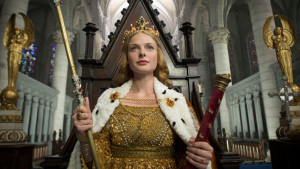Fierce debate rages amongst super-cool Royal history geeks as to the merits of high-profile historical fiction. On the one hand, it sparks interest within the general population; on the flip side, it encourages severe inaccuracies to flow through the popular consciousness.
Generally, I’m in the ‘pro’ camp. If interest is sparked, there is a greater opportunity for misconceptions to be corrected. Besides, I really like reading and watching it all.
So when I heard that the ‘White Queen’ would enjoy a sequel in America – although not in Britain – I thought this was good news. The BBC series in 2013 sparked interest in the Wars of the Roses and the matriarchs of the Tudor dynasty more than anything I’ve ever known.
But…but, but, but, but, but…the inaccuracies were of epic proportions, to a much greater extent than the Philippa Gregory books on which they were based. It’s so important that this is realised.
Let me start by trying to tidy up a few bits. Primarily I want to say what I think was wrong with the portrayals of the three main heroines, Elizabeth Woodville, Margaret Beaufort and Anne Neville:
Elizabeth Woodville – Beautiful, heroic and tragic. All of these were true, but unlike in the book, her negative qualities just did not come across. True, she was vengeful toward those who hurt her family (though later, unconvincingly, forgave brother-in-law George), but where was the ambition, the vindictiveness, the ruthlessness and the spite? The entire court loathed Elizabeth and her kin. They must have had some kind of reason and their savagely ambitious personalities were a part of this. In one sense Elizabeth is no hero at all, but very much a medieval woman on the make. This was just not clear enough.
Margaret Beaufort – I’m sorry, but no. Yes, Margaret had blood and marital connections to Lancaster (and no doubt preferred Henry VI to Edward IV), but she was no blind fanatic to the cause of the Red Rose. Yes, she had dramatic loyalty to her son, but never in his tender years did she expect him to be King. It is well documented that she was a pious woman, but she was no crazed fundamentalist and let’s be clear – nor was she a sinister child killer. The Margaret that I have researched was a cautious pragmatist that would one day take a huge gamble that ultimately paid off. I’m also not sure why they decided to ruin her marriage to Henry Stafford, the relationship which was probably the happiest of her life.
If people are interested in a more balanced picture of Margaret Beaufort’s life and character, check out our content from Margaret Beaufort week.
Anne Neville – It wasn’t so much that they got Anne Neville’s character wrong; the problem was that they actually gave her one. Anne Neville, through the manipulations of her father and two fateful marriages to key players in the political scene, would have seen a lot. However, there is very little evidence to suggest that she herself ever inputted much. I really don’t think she helped to mastermind Lancaster’s military strategy in 1470; neither do I think she pressured her husband to do away with her nephews.
If the book is anything to go by, the new series of ‘The White Princess’ is also going to require some correcting. Never fear though geeks…that is a post for another time!

